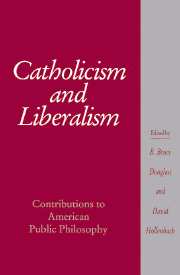Book contents
- Frontmatter
- Contents
- List of contributors
- Preface
- Introduction
- PART I HISTORICAL CONFLICTS AND DEVELOPMENTS
- PART II NEW ENCOUNTERS AND THEORETICAL RECONSTRUCTIONS
- PART III PRACTICES AND INSTITUTIONS
- 9 Catholicism and liberal democracy
- 10 Feminism, liberalism, and Catholicism
- 11 The family, liberalism, and Catholic social teaching
- 12 Rights of persons in the church
- Afterword: a community of freedom
- Index
10 - Feminism, liberalism, and Catholicism
Published online by Cambridge University Press: 19 February 2010
- Frontmatter
- Contents
- List of contributors
- Preface
- Introduction
- PART I HISTORICAL CONFLICTS AND DEVELOPMENTS
- PART II NEW ENCOUNTERS AND THEORETICAL RECONSTRUCTIONS
- PART III PRACTICES AND INSTITUTIONS
- 9 Catholicism and liberal democracy
- 10 Feminism, liberalism, and Catholicism
- 11 The family, liberalism, and Catholic social teaching
- 12 Rights of persons in the church
- Afterword: a community of freedom
- Index
Summary
The global women's movement and the varieties of feminist theory informing this movement require imaginative thinking about how issues of gender justice and equality affect attempts to address tensions between liberalism and Catholicism in the American milieu. This essay will consider liberal and Catholic traditions from a feminist perspective and argue that feminist theory presents an alternative vision of social justice which criticizes yet incorporates elements from liberalism. It also maintains that while Catholic thought and practice has not adequately addressed the challenge of contemporary feminism, Catholic tradition is rich in resources which feminists can use to press the case for theoretical and practical change in church and society.
There are three reasons for such a study. The first is apologetic (in the sense of an apologia or defense). Many deficiencies of contemporary liberal capitalist society – abstract individualism, subjective and relativist conceptions of the good, the cultural excesses of an untrammeled exercise of individual choice, the decline of the family, and a decrease of volunteerism in community life – are attributed at least in part to the contemporary feminist movement. Some worry that as women become more concerned with asserting their worth as individuals, they will lose what Carol Gilligan has identified as a special moral emphasis on care and responsibility for others and, as a result, society will be diminished. I think this characterization of the effects of the women's movement is inaccurate and seek to defend feminism against such criticisms.
Second, liberal feminism, that strand of feminist theory upon which I focus here, derives from the liberal tradition historically and builds upon its central notions of human dignity and individual rights.
- Type
- Chapter
- Information
- Catholicism and LiberalismContributions to American Public Policy, pp. 242 - 268Publisher: Cambridge University PressPrint publication year: 1994
- 1
- Cited by



